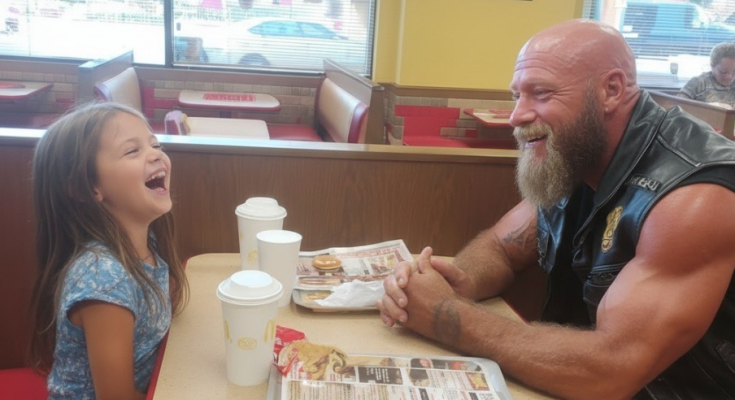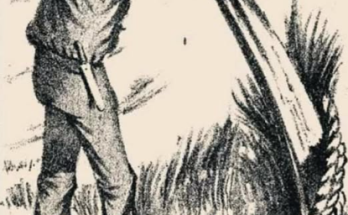“Uncle Bear”
Every Saturday at noon, the same scene played out at a corner booth in a McDonald’s just off Route 17. A hulking man in leather, his arms inked with skulls and dragons, sat quietly with two Happy Meals. His face was a roadmap of scars, his eyes sharp and unreadable. Locals called him Bear. Most avoided him.
But one little girl didn’t.
She’d burst through the doors like sunlight, her pigtails bouncing, her smile wide. “Uncle Bear!” she’d shout, leaping into his arms. He’d catch her like she was made of glass, his massive hands cradling her with impossible gentleness.
To outsiders, it looked wrong. A tattooed biker and a seven-year-old girl? Whispers spread. Parents clutched their children tighter. The manager watched nervously. And finally, someone called the cops.
Three officers arrived one Saturday, their presence turning the restaurant into a frozen tableau. Bear saw them first. His eyes flicked to the exits. Twenty years in the Marines and fifteen riding with the Nomad Warriors MC had taught him how to read a room. But he didn’t move.
Lily saw them next. Her face went pale. She clung to Bear’s arm. “Are they taking you away too? Like they took Daddy?”
Bear placed a hand on her head. “Nobody’s taking me anywhere, sweetheart. We haven’t done anything wrong.”
The lead officer approached. “Sir, we’ve received some concerns—”
“I have legal documentation,” Bear said, slowly reaching for his wallet. He handed over a laminated court document.
The officer read it. His expression shifted. He looked at Bear, then at Lily, then back at the paper.
“You’re her father’s brother from the Marines?”
Bear nodded. “We served three tours together in Afghanistan. He saved my life twice. I saved his once. When he was dying, I made him a promise.”
The officer’s voice softened. “Her father was killed in action?”
Bear’s jaw clenched. “No. That would’ve been easier.”
Lily was coloring on her placemat, pretending not to hear. But her shoulders were tense.
“Her father came home broken,” Bear continued. “PTSD. Traumatic brain injury from an IED. He tried to fight it for three years. His wife left. Took Lily. He spiraled.”
The officer kept reading. “This says you were granted supervised visitation rights?”
“Every Saturday,” Bear said. “Her mom agreed to let me see her once a week. She didn’t want Lily to lose every connection to her dad.”
The manager had crept closer. Other customers were pretending to eat, but everyone was listening.
Bear looked down at Lily. “She calls me Uncle Bear because that’s what her dad called me. I was the one who taught him how to ride. How to survive the Corps. How to survive the streets when he came back.”
The officer handed back the document. “You’re not under investigation. You’re doing everything legally.”
Bear nodded. “But that doesn’t stop people from assuming the worst.”
The officers left. The restaurant remained quiet. Lily kept coloring. Bear sat still, his presence no longer threatening but tragic.
Later, the manager approached. “I’m sorry,” he said. “I didn’t know.”
Bear shrugged. “You weren’t supposed to.”
—
The truth was, Bear had once been feared for good reason. He’d lived hard. Fought harder. His body bore the marks of battles—some in war zones, some in bars. But everything changed the day he got a call from a VA hospital. His brother-in-arms was dying. Not from bullets or bombs, but from the slow erosion of a mind that couldn’t forget.
Bear had driven across three states to get there. Held his friend’s hand as he wept. Promised to watch over Lily. Promised to be the one constant in her life when everything else fell apart.
He’d traded his bike for a pickup. Traded whiskey for therapy. Traded rage for routine. Every Saturday, he showed up. No matter what.
He learned how to braid hair. How to listen to stories about unicorns and math tests. How to be the kind of man who didn’t scare children—but protected them.
And yet, the world only saw the leather. The tattoos. The scars.
—
One day, Lily asked, “Why do people look at you like you’re bad?”
Bear paused. “Because I look like someone who’s done bad things.”
“Have you?”
He nodded slowly. “Yes. But I’m trying to be better.”
She thought about that. “Daddy tried too.”
Bear swallowed hard. “He did.”
“Do you think he’s proud of you?”
Bear looked out the window. “I hope so.”
—
Months passed. The whispers faded. The manager started saving their booth. Other parents stopped staring. Some even smiled.
One Saturday, Bear arrived to find Lily waiting with a drawing. It was him, holding her hand, with a big heart around them.
“I told my teacher you’re my hero,” she said.
Bear blinked. “Why?”
“Because you never gave up on Daddy. And you never gave up on me.”
He couldn’t speak. Just hugged her tight.
—
Years later, Lily would tell the story in a college essay. About the man everyone feared. The man who saved her life. The man who taught her that heroes don’t always wear capes. Sometimes, they wear leather and carry scars.
And when she graduated, Bear was there. Front row. Tears in his eyes. Still wearing his biker vest. Still misunderstood by many.
But not by her.
Never by her.

